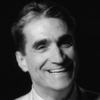Robert Pinsky

Robert Pinsky
Robert Pinskyis an American poet, essayist, literary critic, and translator. From 1997 to 2000, he served as Poet Laureate Consultant in Poetry to the Library of Congress. Pinsky is the author of nineteen books, most of which are collections of his poetry. His published work also includes critically acclaimed translations, including The Inferno of Dante Alighieri and The Separate Notebooks by Czesław Miłosz. He teaches at Boston University...
NationalityAmerican
ProfessionPoet
Date of Birth20 October 1940
CityLong Branch, NJ
CountryUnited States of America
I think my first experience of art, or the joy in making art, was playing the horn at some high-school dance or bar mitzvah or wedding, looking at a roomful of people moving their bodies around in time to what I was doing. There was a piano player, a bass player, a drummer, and my breath making the melody.
When I was a kid, there was unhappiness in my family - was dealt with partly by escaping to television. And from a very early age, for whatever reason, I became scornful and resistant to and angry about that. And some other time in my life, I realized that there's a lot I loved in television.
Method involves a slavish addiction to laws, and we can only aspire to anarchy.
Jazz and poetry both involve a structure that may be familiar and to some extent predictable. And then, you try to create as much surprise and spontaneity and feeling and variation while respecting that structure.
I think art is not an ornament or refinement at the fringes of human intelligence, I think it's at the center. It's at the core.
I'm far from immune to the American, perhaps historically male, prejudice toward practical and physical competence; I hope I've also considered that prejudice enough to have some distance from it.
The best argument for teaching poetry is to put a three-year-old or a four-year-old and read Dr. Seuss, or Robert Louis Stevenson, and to feel how the child and you are engaging in something that's really basic to the animal, which is passing on in these rhythmic ways, something that came from somewhere.
'Write' is almost the wrong verb for what I do. I think 'compose' is more accurate because you're trying to make the sounds in your mind and in your voice. So I compose while I'm driving or in the shower.
Vivid and reflective, documentary and visionary, re-imagining the city of New York with the same urgency that ponders the opening words of Genesis, this is a passionate, artful and re-readable book.
All questions of process require an answer that begins with a very important sentence, and the sentence is: 'Everybody is different.' Whatever way of working you name - methodical, haphazard, gets up early in the morning, sleeps all day, works at night, revises immensely, never revises at all - someone has made great work with that way.
It's true that school can poison things - some people hate W.C. Williams' little poem about the wheelbarrow because somebody bullied them with it in school,
For an American, there's no automatic place where people love the art of poetry. There's not a social class that considers poetry its property the way in some countries there's a snob value to the art.
For a lot of people, well-meaning teaching has made poetry seem arcane, difficult, a kind of brown-knotting medicine that might be good for you but doesn't taste so good. So I tried to make a collection of poetry that would be fun. And that would bring out poetry as an art, rather than the challenge to say smart things.
The test of whether it's poetry is: does it sound beautiful when you say the words over, in your mind or your voice, with no skilled performer, no music, just the sounds and meanings in the words themselves,